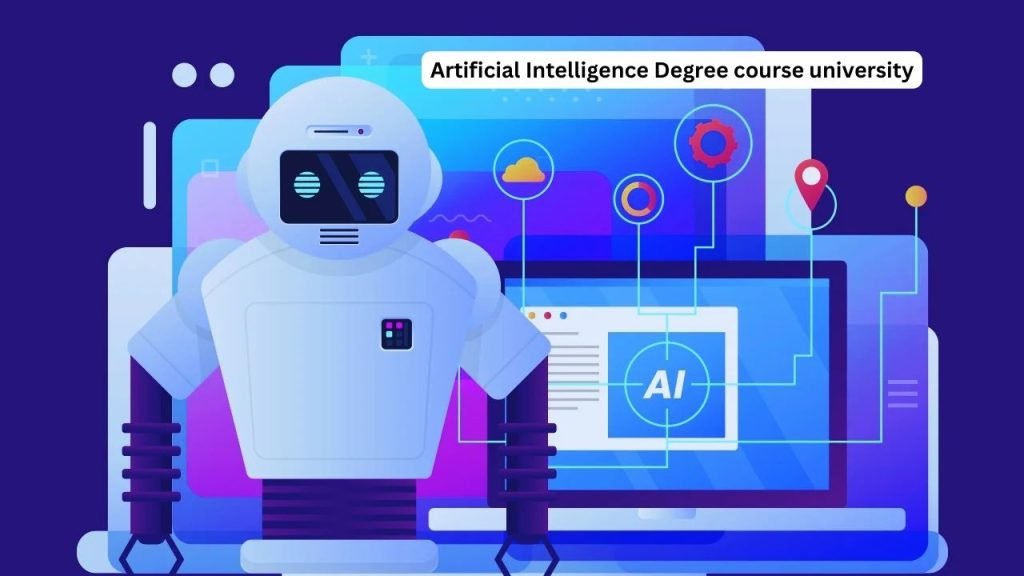An artificial intelligence degree course typically refers to an academic program offered by universities or colleges that focuses on teaching students about the theory, techniques, and applications of artificial intelligence (AI). These courses are designed to provide students with a solid foundation in computer science and mathematics, along with specialized knowledge in areas such as machine learning, robotics, natural language processing, computer vision, and AI ethics.
Artificial Intelligence Degree course university
If you’re interested in pursuing a degree in Artificial Intelligence (AI) at a university, there are several institutions globally renowned for their programs in this field. Here are some top universities known for their AI programs:
Massachusetts Institute of Technology (MIT), USA: MIT is renowned for its strong focus on computer science and AI research. It offers undergraduate and graduate programs with various specializations in AI.
Stanford University, USA: Stanford is another leading institution in AI research and education. Its AI program is part of its computer science department and is highly regarded worldwide.
University of California, Berkeley (UC Berkeley), USA: UC Berkeley’s computer science department has a strong emphasis on AI and machine learning. It offers both undergraduate and graduate programs in AI.
University of Oxford, UK: Oxford’s Department of Computer Science has a robust AI program, with research spanning various aspects of artificial intelligence.
University of Cambridge, UK: Cambridge is known for its research excellence in AI and offers undergraduate and graduate programs that cover a wide range of AI topics.
Carnegie Mellon University (CMU), USA: CMU’s School of Computer Science is highly respected in the AI community. It offers specialized programs in machine learning, robotics, and AI.
Read More
- Machine Learning Engineer Bachelor’s Degree
- Affordable Online MBA Programs For International Students
- Home Insurance Affordability Actuaries Institute
What is Artificial Intelligence Degree course?
AI degree courses can be offered at both undergraduate and graduate levels, with varying degrees of specialization and focus depending on the institution and program. Graduates of AI degree programs are typically prepared for careers in AI research and development, data science, machine learning engineering, robotics, natural language processing, and other AI-related fields in academia, industry, or government.
When considering where to study AI, it’s essential to look not only at the university’s overall reputation but also at the specific faculty members and research areas within the AI program that align with your interests. Additionally, factors such as location, internship opportunities, and industry connections can also play a significant role in your decision.
Here are some key aspects typically covered in an AI degree course.
Core Computer Science Foundation: Students often start with core courses in computer science, including programming, data structures, algorithms, and computer architecture. These are essential for understanding the underlying principles of AI.
Mathematics: AI heavily relies on mathematical concepts such as linear algebra, calculus, probability theory, and statistics. Courses in these areas are crucial for understanding the mathematical models and algorithms used in AI.
Machine Learning and Data Mining: These courses cover techniques and algorithms used for learning from data, including supervised learning, unsupervised learning, reinforcement learning, and deep learning. Practical aspects such as model training, evaluation, and deployment are also typically covered.
Natural Language Processing (NLP): NLP courses focus on understanding and processing human language using computational methods. This includes tasks such as text classification, sentiment analysis, machine translation, and speech recognition.
Computer Vision: Courses in computer vision explore methods for processing and understanding visual data, including image and video analysis, object detection and recognition, and image segmentation.
Robotics: AI courses may also cover robotics, including topics such as robot perception, motion planning, and autonomous navigation. This area often intersects with AI techniques to enable intelligent behavior in robots.
Ethics and Societal Implications: Given the ethical concerns surrounding AI technologies, many programs include courses that discuss the societal impact of AI, ethical considerations in AI design and deployment, and legal frameworks related to AI.
Capstone Projects or Research: Many AI degree programs include a capstone project or research component where students work on real-world AI problems under the guidance of faculty or industry mentors. This allows students to apply their knowledge and skills in a practical setting.
